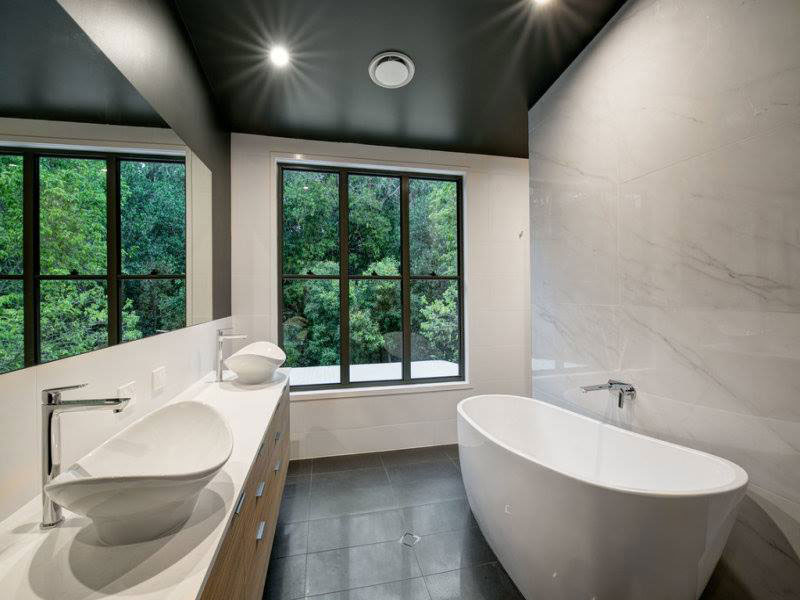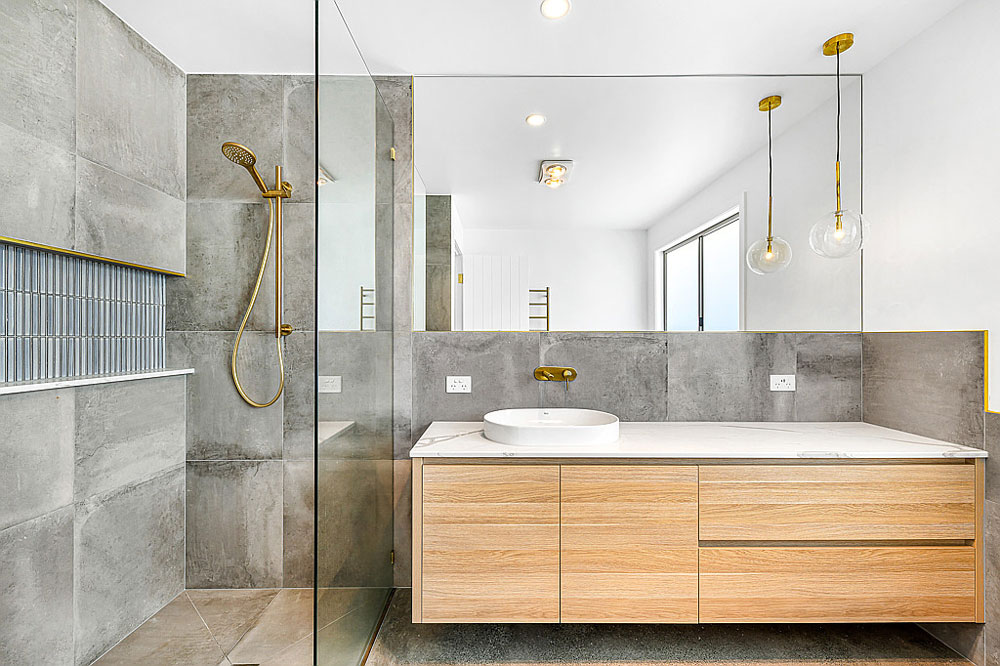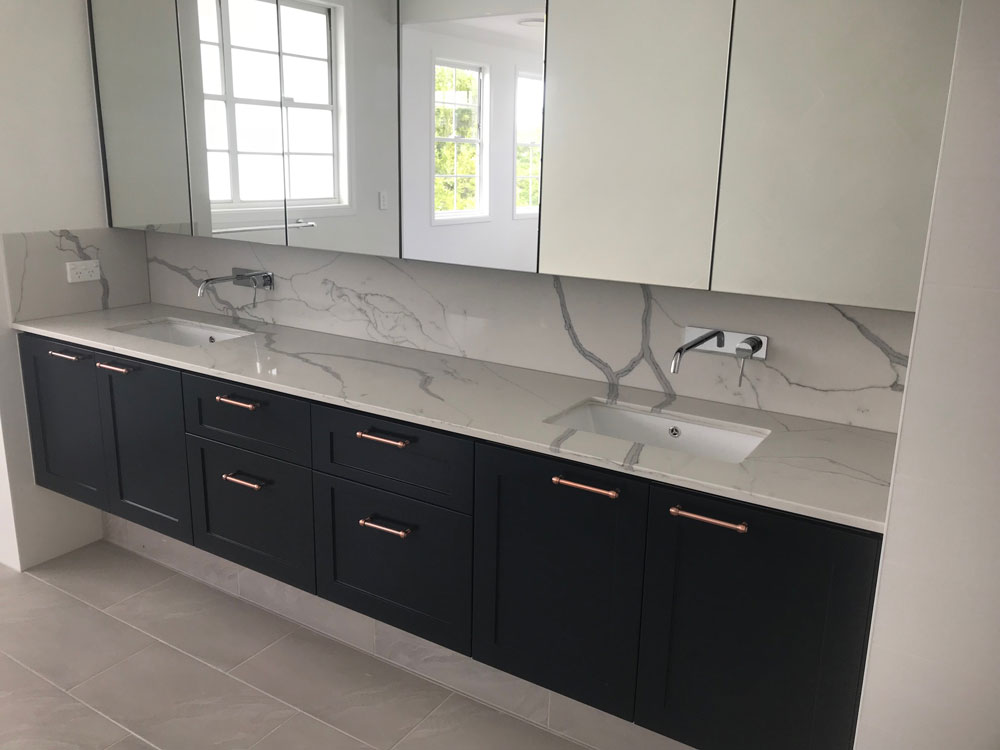Care & Maintenance
General care for the majority of stone types – the don'ts...
DON’T ever sit or stand on your benchtop. Whilst the stone is very strong, the under cabinet or substrate may not be, especially the thinner edge in front of the sink and hotplate. Ensure your electrician and painter use a ladder and not your benchtop!
DON’T put extremely hot things on your benchtop. Most of the stones are heat resistant but not heat-proof. Always use a hot plate rest or trivet. You can crack or discolour your benchtop if you put an extremely hot saucepan on it!
DON’T slide rough items along your benchtop. Again, most of the stone products are scratch resistant but not scratch-proof. An unsealed terracotta pot slid across the bench can scratch the stone. Put felt pads under them.
DON’T leave spills. Wipe up all food and liquid spills as soon as possible. Citrus, fruit juices and vinegar are acidic and can eat into the stone, especially Marble & Limestone. Softdrinks will also. Red wine, beetroot, etc can stain stone especially the lighter colours. Also be vigilant with fat and oil stains especially around the hotplate. Dark stone can look darker with oil spats as the oil seeps into stone which isn’t sealed well. Even after sealing some stone will chemically react with acidic liquids. And they can dull the shiny stone surface. Be wary of toothpaste, mouthwash, soap, nail polish remover, hair spray, perfume. Blue loo for toilets can stain. Chewing gum, paint etc can usually be scraped off with a sharp blade.
DON’T use abrasive cleaners such as Ajax or Jif. Daily clean with warm water and a damp cloth is usually all that you need. Methylated Spirits is ideal for a streak free finish. For stubborn stains you can use cream cleansers. But always read the label on your cleaning product. Don’t use metal scouring pads or metal scrubbers. Don’t use paint stripper etc on your benchtop. Be very careful with oven cleaners. Household bleach (dilute) and Gumption can be used effectively.
DON’T use your benchtop as a chopping board. You will ruin your knives! Most stone products, natural and man-made are extremely hard but if you cut/chop in same spot over time it will be noticeable. Use a proper chopping board!
DON’T leave metal cans etc as they could rust. A rust ring will be a pain to polish out. Bobby pins on a bathroom vanity will also leave a rust stain. Lightly polish with a light creme cleanser.
DON’T knock the edge of you benchtop with plates, cups, etc. The edges near sinks and dishwashers are often knocked with plates etc and chips can easily occur. If you do chip the edges, don't try to repair it yourself, especially with super glue – it will just make the repair job a whole lot worse. Try to keep the chipped piece and call Stone Concepts ASAP.






General cleaning
Most shiny stone tops will look smeared if not wiped properly. If using soap or dishwashing liquid, more often than not, it is the soap residue left behind which leaves the smear.
Using a clean cloth and hot water can usually take off the majority of what needs to be cleaned. Methylated spirits is ideal – it doesn’t leave streaks. A followup with a clean polishing cloth will ensure a shiny top.
Don’t use metal scouring pads or metal scrubbers. Household bleach (diluted) and Gumption can be used effectively.
CLEANING for RECONSTITUTED STONE
(Man-made/engineered)
Caesarstone Brand Spry Cleaner, Caesarstone Brand Creme Cleanser; Methylated Spirits.
CLEANING FOR NATURAL STONE
While most natural stones will be factory sealed you can request a secondary sealing.
Honed (matte) finished stones aren’t less susceptible to scratching and etching however they still should be sealed.
Marble, limestone – Ensure the cleaning product is PH neutral. Use Methylated Spirits and Rejuevenator Cleaner.
Sealing
Many of the recon stones such as Caesarstone doesn’t need sealing for up to 10 years. Of course it always depends on what cleaning products have been used and how often over time.
The majority of natural stones are factory sealed however you may want to ensure it with a second sealing.
Repairs
Be careful around your sink and dishwasher – these are the places you are most likely to knock a plate or cup against, and whilst stone benchtops are extremely hard wearing and resilient the edges are susceptible to chips. But chips can be fixed. Etches and scratches can also be repaired, and most stains can be removed.
A crack in the stone is a lot harder to repair and often can’t be repaired so take special care not to stand or put weight on the thinner edges such as in front of the hotplate or in front of the sink. It has happened many times where your painter or electrician uses the benchtop instead of a ladder. This will not be covered by any stonemason or manufacturer if it is broken after installation. Also houses can move and foundations can drop, which can effect stone stress points.
If you do chip your benchtop try to keep any piece that has chipped out as we may be able to use it to repair it. Don’t try to repair it with superglue yourself – if it doesn’t work then the repair job will be a lot more work.
Direct sunlight
Most of the reconstituted stones are effected over time by exposure to direct sunlight resulting in slight colour changes.
